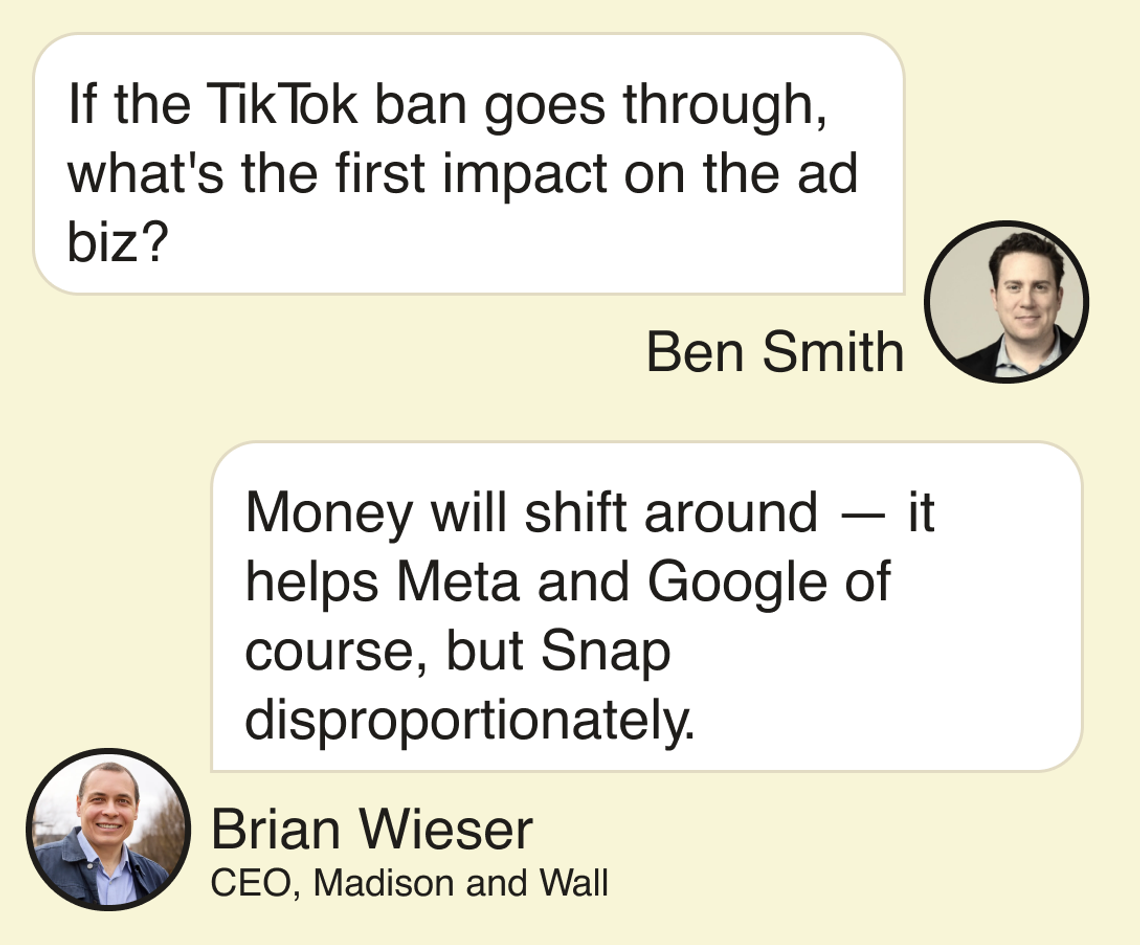| In this edition: NPR braces for 2025.͏ ͏ ͏ ͏ ͏ ͏ |
 | Ben Smith |
|
Welcome to Semafor Media, where there’s never enough news.
It’s been a while since I woke up on a Sunday morning and immediately fumbled through YouTube for the Al Jazeera livestream, where shocked correspondents were narrating joyful scenes they couldn’t have imagined. On my second screen, I scrolled through X videos of Syrians liberating Sednaya prison.
We’re living in a more jaded age than the moment this evoked from afar, the Egyptian uprising of 2011. Then, commentators who questioned the staying power of the opposition, or democratizing power of Twitter or Al Jazeera, were viewed as cynics.
Now much of the Western media sees social and other new platforms as sowers of misinformation, while the MAGA right celebrates them. This fall’s unexpected, livestreamed conflicts — in Syria, and in the Republic of Georgia — come as the MAGA movement, itself deeply entangled with fragmented digital media, is trying to figure out its foreign policy.
President-elect Donald Trump’s movement floats on the emotion of social media, and his supporters tend to see themselves in the liberated Syrian political prisoners and the Georgian women waving flags — not the jailers or the police with water cannons.
That’s not necessarily at odds with Trump’s core promise, reiterated over the weekend, to stay out of foreign entanglements. It’s more in conflict with the views of figures like Tulsi Gabbard, his nominee to be the director of national intelligence, who style themselves as hard-headed realists ready to deal with dictators. Now the images going viral on Elon Musk’s X are of free Syrians and pro-European Georgians — though the platform’s owner and top poster seems not to be touching them so far.
Also today: Max has a long look at NPR’s prospects for 2025 and beyond. Plus, two takes on the future of NBCUniversal’s cable channels, Vox’s split with Taylor Lorenz, and the coming changing of the guard for the Washington Post. (Scoop count: 6)
| |  | Max Tani |
| |
 (Ted Eytan/Wikimedia Commons) (Ted Eytan/Wikimedia Commons)THE SCOOP Last week, Republican Sen. John Kennedy introduced the subtly named “No Propaganda Act.” If enacted, it would end federal funding for America’s public media. He joined an effort by billionaires Elon Musk and Vivek Ramaswamy, who are heading up an amorphous cost-cutting advisory group for President-elect Donald Trump and have also suggested that support for public media should be eliminated from the federal budget. Musk’s suggestion and Kennedy’s bill got little press coverage for an understandable reason: It’s nothing new. Kennedy is the latest in a long line of Republicans who have drafted legislation to defund NPR, PBS, their member stations and their primary funding mechanism, the Corporation for Public Broadcasting. Efforts to defund NPR and PBS have been raised by Republicans and successfully batted away by public media defenders with annual regularity for decades. MAX’S VIEW This time could be different. Republicans’ focus on the media has never been remotely this intense. While PBS has found some success on YouTube, NPR’s incomplete digital transformation, declining radio listenership, and high-profile political stumbles have left it weaker than ever. Now there’s greater concern among public radio figures than there has been in years about the future of NPR and public radio broadly. The threats also come at a moment when NPR and its member stations also face commercial rivals like The New York Times, Spotify, and other audio giants, who have challenged and in many cases weakened their longtime hold on listeners. And the differences between NPR and its member stations over the direction of public radio, and how best each can tackle changes to user behavior that have sucked audio audiences into podcasting, have made the path forward even less clear. |
|
| |  | Ben Smith |
| |
 Rupert Murdoch (left) and son Lachlan in 2017. (Robert Deutsch/USA Today Sports/via Reuters) Rupert Murdoch (left) and son Lachlan in 2017. (Robert Deutsch/USA Today Sports/via Reuters)My colleague Liz Hoffman has written that “SpinCo,” the new proprietor of NBC’s cable assets, will be born with a strong balance sheet and a view of itself as “predator, not prey” — a phrase I hear the new company’s CEO, Mark Lazarus, has taken a liking to. But it won’t be the only contender in a mad scramble that I suspect will make some podcasters very, very rich next year. Fox Corp. also has a strong balance sheet and a digital acquisition that has turned out extremely well in Tubi, whose CEO, Paul Cheesbrough, is leading the broader group’s digital strategy. Now Fox is talking to potential acquisition targets in political media, particularly on the right. Some of the companies that might be in play include Ben Shapiro’s Daily Wire; Red Seat Ventures, which produces for figures like Tucker Carlson and Megyn Kelly; the podcast company Audioboom; and the radio-and-podcast giant iHeart. The All-In Podcast also draws quite a bit of attention. But the big Silicon Valley money — Elon Musk’s X is another logical buyer for conservative media — may drive valuations out of range even for Fox. Some of these acquisitions would require a reorientation for a company that is used to controlling talent with an iron hand. It would also represent a kind of detente between Rupert Murdoch and Google, against which he’s waged a long global war: YouTube is the dominant visual platform for the new era of whatever we’re calling podcasts now. One sign of that detente, a Fox insider notes: YouTube CEO Neal Mohan was invited to address company executives at Fox CEO and executive chair Lachlan Murdoch’s home in November. |
|
MSNBC producers are going to love New Jersey |
 30 Rockefeller Plaza. (Richard Hendrick/Unsplash) 30 Rockefeller Plaza. (Richard Hendrick/Unsplash)NBCUniversal’s offloading of SpinCo has prompted high level questions and speculation about what exactly the plan is for declining linear TV channels. SpinCo has several paths forward, whether as a consolidator of more declining linear TV assets, a risk-taking investor in promising but cash-strapped digital media properties, or as a target for acquisition itself (or a little bit of each). Lazarus hasn’t figured out any of that yet. Instead, in the weeks since the spinoff was announced, his major focus point has been the complex and unprecedented logistics of untangling the broadcast operations of MSNBC and CNBC from NBCUniversal, which feeds the networks with newsgathering and shares physical space with them at 30 Rock in Midtown and in various locations across the city. Questions about the content and the future of talent appear to be largely on hold at the moment, while those other issues get answered. (MSNBC rank and file have been concerned that the new SpinCo has not promised to recognize the employee union.) Lazarus is spending time thinking about building out his leadership team, but even top-level leadership questions are taking a backseat. Chief among these concerns is the looming move en masse to New Jersey or worse, Connecticut, that has staff of almost all levels spooked. While Lazarus has promised that the networks will maintain a Manhattan presence, SpinCo’s relocation to the outskirts of the city is a physical manifestation of the networks’ place in the world. As cable news declines in relevance, and as many formerly generous TV salaries have gone flat or declined themselves, many now Manhattan-based employees feel that a relocation to the far reaches of Stamford or Edgewood Cliffs would be a literal bridge (or several) too far. |
|
Lorenz and Vox parting ways |
 A screenshot of a YouTube playlist promoting Lorenz’s “Power User” show, captured Sunday. Vox Media’s branding is still visible. A screenshot of a YouTube playlist promoting Lorenz’s “Power User” show, captured Sunday. Vox Media’s branding is still visible.Vox Media is ending its deal to distribute Taylor Lorenz’s podcast and YouTube show. The company had a short-term partnership with the high-profile tech reporter that is set to expire at the beginning of the year, Semafor has learned. The company announced its partnership with Lorenz earlier this year in Axios, which dubbed the distribution deal a “huge win” for the company, as it tried to partner with premiere podcast talent on distribution, monetization and strategy. Still, while Lorenz remains one of the most talked-about journalists in digital media, her social media persona is a magnet for criticism both for her and for media companies associated with her. Vox’s decision not to renew the show was made before Lorenz’s comments this week, in which she appeared to justify the killing of UnitedHealthcare’s CEO as an expression of public discontent. (She clarified in a Substack post that she was not defending the shooting, and was instead making a point about the US health care system.) In a post on X earlier this month, Lorez said she was revamping Power User, moving it away from an interview show, and was looking for a co-host. Lorenz declined to offer specifics, but told Semafor that she was very pleased with her experience working with Vox. “Vox is the best podcast network out there and I can’t speak more highly of them,” she said. |
|
 The veteran media chronicler Ken Auletta — who in 1985 wrote the book on the disruption of broadcast by cable, and in 2018 covered the disruption of advertising by Google and Facebook — thinks Elon Musk is more like the cable pioneer Ted Turner than anyone else he’s written about, brilliant and disruptive and “both a little crazy and on the spectrum in some fundamental ways.” (Turner has publicly wrestled with bipolar disorder; Musk has said he has Asperger’s syndrome.) One difference is that Turner’s devotion was to the media business: “He would literally lie down on the floor of Brian Roberts’ father to try and sell Comcast ads for Turner.” Auletta also reminisced about traveling with Turner, whose personal life was as unbounded as Musk’s. (You’ll have to listen for that anecdote.) Musk’s role in American life right now is larger than even Turner’s then, but the analogy rings true. Listen to our conversation on this week’s Mixed Signals podcast. |
|
Brian Wieser is CEO of Madison and Wall, an advisory and data company for tech and media companies focused on the advertising industry.  |
|
 Carlyle Co-Chairman David Rubenstein, Citadel founder and CEO Ken Griffin, former US Commerce Secretary Penny Pritzker, and KKR Co-Chairman Henry Kravis will serve as co-chairs of Semafor’s World Economy Summit on April 23-25, 2025, in Washington, D.C. This third-annual event will bring together US cabinet officials, global finance ministers, central bankers, and Fortune 500 CEOs for conversations that cut through the political noise to dive into the most pressing issues facing the world economy. Join the waitlist for more information and access to priority registration. |
|
 ⁛ News Will Lewis. (Lance Cheung/USDA) Will Lewis. (Lance Cheung/USDA)Coming soon: The Washington Post is expected to announce a new top editor before the end of the year, as the formal executive search process has begun to reach its conclusion. Over the weekend, staff at the paper expressed fears that managing editor Matea Gold, the favorite pick of many Post reporters, will likely be passed over by CEO Will Lewis and owner Jeff Bezos and could depart the paper as a result. Gold and the paper did not respond to requests for comment. (Status reported first on Sunday that Gold was leaving for The New York Times.) Meanwhile, the paper’s unionized staff are frustrated that someone keeps taking down printed-out images of CEO Will Lewis that staff have put up around the office to protest the lack of an editorial all-hands meeting. According to an email sent to union members obtained by Semafor, to correct this, unionized staff will be distributing pictures of Lewis that will be placed at individual members’ desks. Dept. of Bundles: Ben predicts to Nieman that bundles are about to come roaring back. (Perhaps in print??) G/O off: G/O’s ChatGPT-powered scraper had to be shut down this week after it published several errors. Over the last year, the company has used artificial intelligence to churn out pieces on securities and exchange filings at Quartz, rolling out hundreds of stories each day. The company turned off its AI feed earlier this week after it accidentally occasionally published erroneous company names and figures from another company. The company has continued to be plagued by legal setbacks from critics of its reporting and its own employees. Last month, an Illinois court ruled that Mike McAvoy, the former president of The Onion, was owed over $600,000 by the company, plus legal fees, in a wrongful termination suit he filed in 2019. Earlier this week, a Delaware court also set a trial date for an ongoing defamation lawsuit against the G/O sports site Deadspin over an article accusing a 9-year-old NFL fan and his family of racism. ✦ MarketingInter-omni: Omnicom Group is closing in on a deal to acquire Interpublic Group in a deal that would make the combined company the biggest in advertising, The Wall Street Journal scooped Sunday. The move is part of a deal to compete with Publicis, an ascendant French ad holding company that has grown its market share by easily bundling its different products, including data, IT, distribution, and creative. |
|
  Hamad I Mohammed/Reuters Hamad I Mohammed/ReutersRwanda is pushing ahead with its bid to be added to the lucrative Formula 1 race calendar, Semafor’s Alexis Akwagyiram scooped. The initiative is part of a wider drive to double down on sports events as a central plank of its economic growth plan. “We have demonstrated the capacity to host big sporting events,” Rwanda’s foreign minister told Semafor. |
|











